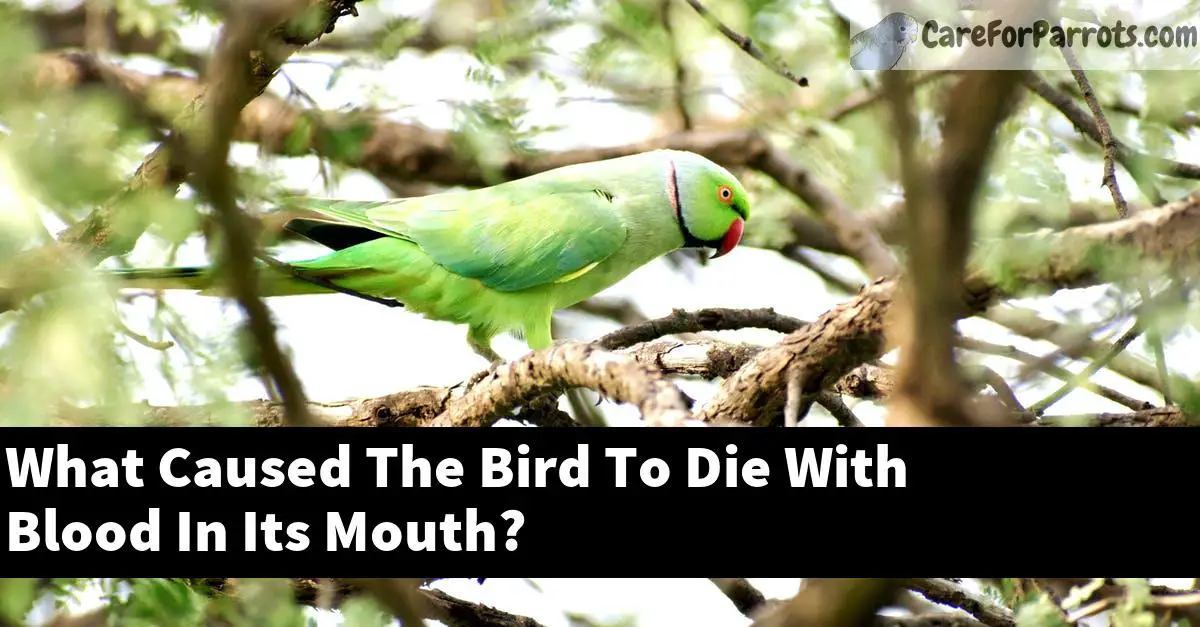Birds are amazing creatures, capable of captivating us with their beautiful plumage, enchanting songs, and fascinating behaviors. But what happens when we find a bird dead, with blood in its mouth?
It can be a distressing sight, and it’s natural to wonder what could have caused it.
In this article, I will explore some common causes of death in birds and discuss why a bird might die with blood in its mouth.
Finally, we’ll touch on how to prevent bird deaths and what to do if you find a dead bird.
Table of Contents
Common Causes of Death in Birds
There are several factors that can lead to a bird’s demise. Some of the most common causes of death in birds are:
Disease and Infection
Birds can suffer from various diseases and infections, just like humans. Some common illnesses include avian influenza, salmonellosis, and aspergillosis. These diseases can weaken a bird’s immune system and cause death.
Trauma
Birds can suffer from injuries resulting from collisions with windows, cars, or other objects. They can also be attacked by predators, such as cats or larger birds. Traumatic injuries can lead to internal bleeding and other complications, which can be fatal.
Poisoning
Pesticides, lead poisoning, and ingestion of toxic plants can also be lethal for birds. Exposure to these harmful substances can cause organ failure, neurological damage, or other health issues that can ultimately result in death.
Parasites
Parasites, such as mites, lice, and worms, can weaken a bird’s health by causing anemia, weight loss, and other complications. In severe cases, a heavy parasite infestation can lead to death.
Blood in a Bird’s Mouth: Possible Reasons
If a bird is found dead with blood in its mouth, it can be due to several reasons:
Internal Bleeding
When a bird suffers from internal bleeding, blood can accumulate in its mouth or throat. This could be due to trauma, ingestion of a toxic substance, or disease-causing internal damage.
Respiratory Distress
A bird struggling with respiratory issues, such as aspergillosis or pneumonia, may have blood in its mouth as a result of coughing or labored breathing. These conditions can cause the bird’s respiratory system to fail, ultimately leading to death.
Traumatic Injury
Injuries to the head or neck, whether from a collision or a predator attack, can cause blood to pool in a bird’s mouth. In some cases, these injuries can be severe enough to cause instant death or lead to complications that result in the bird’s demise.
Preventing Bird Deaths
While it’s impossible to prevent all bird deaths, there are steps we can take to minimize the risks:
Safe Environments
Making our homes and gardens bird-friendly can help protect birds from hazards. For example, placing decals on windows can help prevent bird collisions, and keeping cats indoors can reduce the risk of predation.
Regular Health Checkups
For pet birds, scheduling regular checkups with an avian veterinarian can help catch potential health issues early on. Early detection and treatment can often make a significant difference in a bird’s prognosis.
Balanced Diet
Providing birds with a balanced diet is essential for their overall health. A diet that meets their nutritional needs can strengthen their immune systems, helping them better fight off diseases and parasites.
What to Do When You Find a Dead Bird
Finding a dead bird can be unsettling, but it’s essential to handle the situation properly:
Proper Disposal
Wear gloves to avoid direct contact with the dead bird, and place it in a sealed plastic bag. Dispose of the bag in an outdoor trash receptacle. Wash your hands thoroughly afterward to minimize any risk of disease transmission.
Reporting Unusual Deaths
If you notice a sudden increase in dead birds in your area, or if the bird exhibits unusual signs like blood in its mouth, it’s essential to report the incident to your local wildlife agency or public health department. They can investigate the cause of death and take appropriate action if necessary.
Conclusion
Understanding what might cause a bird to die with blood in its mouth can help us better protect these fascinating creatures. Whether it’s due to disease, injury, or environmental factors, it’s our responsibility to create a safer world for birds. By taking preventive measures, reporting unusual deaths, and promoting bird-friendly environments, we can contribute to the well-being of our avian friends.
FAQs
1. Can birds die from stress?
Yes, birds can die from stress, especially if they are already weakened by illness, injury, or poor nutrition. Stress can suppress their immune system, making them more susceptible to diseases and infections.
2. How can I tell if a bird is sick?
Some signs of illness in birds include lethargy, loss of appetite, weight loss, difficulty breathing, and changes in behavior or appearance. If you suspect a bird is sick, it’s essential to consult an avian veterinarian for proper diagnosis and treatment.
3. What should I do if I find an injured bird?
If you find an injured bird, you can contact a local wildlife rehabilitation center or an avian veterinarian for guidance on how to help the bird. It’s crucial to handle injured birds carefully to avoid causing further harm.
4. Can human diseases be transmitted to birds?
While some human diseases can be transmitted to birds, such as avian influenza, most cannot. However, it’s still essential to practice good hygiene when handling birds to minimize any risk of disease transmission.
5. How can I make my backyard more bird-friendly?
To create a bird-friendly backyard, you can provide food, water, and shelter for birds. Planting native trees and shrubs, providing birdhouses, and offering a clean water source can all help attract and support bird populations.






